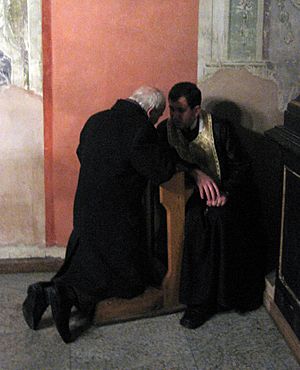Mortal sin facts for kids

In Christianity, a mortal sin is a very serious act that Christians believe can separate a person from God's special grace. It is also called a "deadly" or "grave" sin. The idea of mortal sin is important in both the Catholic Church and Lutheranism. Even though it is very serious, a person can be truly sorry for committing a mortal sin. Being truly sorry is the main step to receiving forgiveness.
Contents
What is a Mortal Sin?
A mortal sin is an action that is considered very wrong in Christian teachings. It is different from less serious sins because it is believed to deeply harm a person's relationship with God. For an act to be a mortal sin, it usually needs three things:
- It must be a very serious matter.
- The person must know it is serious and wrong.
- The person must choose to do it freely.
If these three things are present, the act is seen as a serious choice to turn away from God.
Why is it Called "Mortal"?
The word "mortal" means "deadly." In this case, it means "deadly to the soul." It suggests that such a sin can cause a spiritual "death" by cutting off a person's connection to God's saving grace. However, it's important to remember that Christians believe God is always ready to forgive those who are truly sorry and seek His mercy.
How Can Sins Be Forgiven?
Even after committing a serious sin, Christians believe that forgiveness is possible. The main way to receive forgiveness is through repentance. Repentance means being truly sorry for what you have done and deciding to turn away from sin. It also involves asking God for forgiveness.
Forgiveness in Different Churches
Different Christian groups have slightly different ways of understanding how sins are forgiven.
- In the Catholic Church, forgiveness for mortal sins is usually received through the Sacrament of Confession (also called Reconciliation). During confession, a person tells their sins to a priest, expresses sorrow, and receives absolution. This practice was made a required belief at the Council of Trent.
- In Lutheranism, confession and absolution are also practiced. Historically, Lutherans often confessed their sins on Saturdays to prepare for church services on Sunday. This helps them feel ready to receive God's grace.
See also
 In Spanish: Pecado mortal para niños
In Spanish: Pecado mortal para niños
 | Jackie Robinson |
 | Jack Johnson |
 | Althea Gibson |
 | Arthur Ashe |
 | Muhammad Ali |

